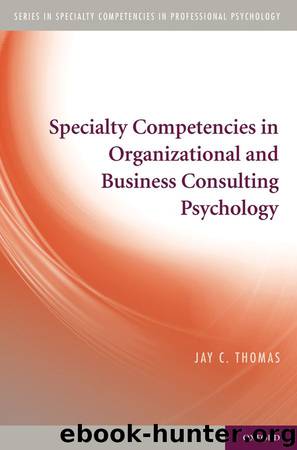Specialty Competencies in Organizational and Business Consulting Psychology (Specialty Competencies in Professional Psychology) by Jay C. Ph.D. Thomas

Author:Jay C. Ph.D. Thomas
Language: eng
Format: mobi
Publisher: Oxford University Press
Published: 2010-08-25T14:00:00+00:00
35p10
6p8
PART I V
Foundational
Competencies—
Th
e OBC Psychologist
as a Professional
This page intentionally left blank
TEN
Business and Consulting Skills
A number of competencies needed for success in organizational and busi-
ness consulting psychology are not specifi c to the fi eld. Under Industrial and Organizational Psychologists (subsuming Consulting Psychologists),
the O*NET describes the extent to which a large number of knowledges,
skills, and abilities are required by the professional (O*NET On-Line, downloaded 10/10/2008). Obviously no single person’s repertoire will match the list, but it is instructive to examine the top 10 of each. Th
e knowledge list pro-
vides few surprises. Psychology is the most important item, followed closely by Personnel and Human Resources; Education and Training and Mathematics are fourth and fi ft h, just behind English Language. More salient for this chapter is the listing of Customer and Personal Service, Administration and Management, Communications and Media, and Clerical (i.e., knowing
administrative and clerical procedures, knowing how to use word process-
ing, and designing forms). Th
ese are the sorts of knowledge expected of
anyone in middle to upper management in most organizations and in most
professions. Th
ey illustrate that success will not fl ow just from competence
in psychology; one must know how to operate in a businesslike manner to
get the job done.
Table 10.1 lists the top 20 skills for I/O psychologists from the O*NET.
Most require no elaboration; a few deserve special comment.
Writing is a skill that ought to be taught in high school or college; in
graduate school psychologists are taught to write using the style dictated by the American Psychological Association (APA style; American Psychological Association, 2009b). While APA style is appropriate for writing scientifi c papers and technical reports, the OBC psychologist writes for 146
Foundational Competencies—Th
e OBC Psychologist as a Professional
TABLE 10.1 Top 20 Skills for the Industrial and Organizational Psychologist from the O*NET
IMPORTANCE
SKILL
O*NET DESCRIPTION
RATING
96
Critical thinking
Using logic and reasoning to identify the strengths
and weaknesses of alternative solutions,
conclusions, or approaches to problems.
92
Active listening
Giving full attention to what other people are
saying, taking time to understand the points being
made, asking questions as appropriate, and not
interrupting at inappropriate times.
87
Speaking
Talking to others to convey information effectively.
85
Reading comprehension
Understanding written sentences and paragraphs in
work-related documents.
84
Writing
Communicating effectively in writing as appropriate
for the needs of the audience.
74
Coordination
Adjusting actions in relation to others’ actions.
73
Judgment and decision
Considering the relative costs and benefi ts of
making
potential actions to choose the most appropriate one.
73
Science
Using scientifi c rules and methods to solve
problems.
69
Time management
Managing one’s own time and the time of others.
68
Learning strategies
Selecting and using training/instructional methods
and procedures appropriate for the situation when
learning or teaching new things.
67
Mathematics
Using mathematics to solve problems.
66
Monitoring
Monitoring/assessing performance of yourself, other
individuals, or organizations to make improvements
or take corrective action.
64
Instructing
Teaching others how to do something.
63
Complex problem solving
Identifying complex problems and reviewing related
information to develop and evaluate options and
implement solutions.
62
Social perceptiveness
Being aware of others’ reactions and understanding
why they react as they do.
Business and Consulting Skills
147
IMPORTANCE
SKILL
O*NET DESCRIPTION
RATING
61
Active learning
Understanding the implications of new information
for both current and future problem solving and
decision making.
56
Persuasion
Persuading others to change their minds or behavior.
53
Service orientation
Actively looking for ways to help people.
52
Systems evaluation
Identifying measures or indicators of system
performance and the actions needed to improve
or correct performance, relative to the goals of the
system.
Download
This site does not store any files on its server. We only index and link to content provided by other sites. Please contact the content providers to delete copyright contents if any and email us, we'll remove relevant links or contents immediately.
The Art of Coaching by Elena Aguilar(53195)
Thinking, Fast and Slow by Kahneman Daniel(12267)
The Art of Thinking Clearly by Rolf Dobelli(10455)
The 5 Love Languages: The Secret to Love That Lasts by Gary Chapman(9792)
Mindhunter: Inside the FBI's Elite Serial Crime Unit by John E. Douglas & Mark Olshaker(9324)
When Breath Becomes Air by Paul Kalanithi(8427)
Periodization Training for Sports by Tudor Bompa(8254)
Becoming Supernatural by Dr. Joe Dispenza(8204)
Turbulence by E. J. Noyes(8040)
Bodyweight Strength Training by Jay Cardiello(7909)
Therapeutic Modalities for Musculoskeletal Injuries, 4E by Craig R. Denegar & Ethan Saliba & Susan Saliba(7716)
Nudge - Improving Decisions about Health, Wealth, and Happiness by Thaler Sunstein(7694)
The Road Less Traveled by M. Scott Peck(7594)
Mastermind: How to Think Like Sherlock Holmes by Maria Konnikova(7324)
Enlightenment Now: The Case for Reason, Science, Humanism, and Progress by Steven Pinker(7306)
Win Bigly by Scott Adams(7184)
Kaplan MCAT General Chemistry Review by Kaplan(6929)
Why We Sleep: Unlocking the Power of Sleep and Dreams by Matthew Walker(6706)
The Way of Zen by Alan W. Watts(6601)
